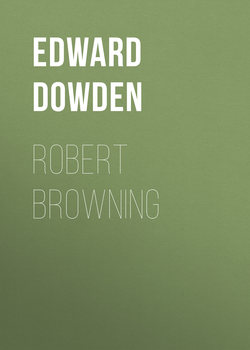Robert Browning

Реклама. ООО «ЛитРес», ИНН: 7719571260.
Оглавление
Edward Dowden. Robert Browning
Editor's Preface
Preface
Chapter I. Childhood and Youth
Chapter II. Paracelsus and Sordello
Chapter III. The Maker of Plays
Chapter IV. The Maker of Plays—(Continued)
Chapter V. Love and Marriage
Chapter VI. Early Years in Italy
Chapter VII. Christmas Eve and Easter Day
Chapter VIII. 1851 to 1855
Chapter IX. Men and Women
Chapter X. Close of Mrs Browning's Life
Chapter XI. London: Dramatis Personae
Chapter XII. The Ring and the Book
Chapter XIII. Poems on Classical Subjects
Chapter XIV. Problem and Narrative Poems
Chapter XV. Solitude and Society
Chapter XVI. Poet and Teacher in Old Age
Chapter XVII. Closing Works and Days
Index
Отрывок из книги
"In the case of those whom the public has learned to honour and admire, there is a biography of the mind—the phrase is Mr Gladstone's—that is a matter of deep interest." In a life of Robert Browning it is especially true that the biography we want is of this nature, for its events are to be classed rather among achievements of the human spirit than as objective incidents, and its interest depends only in a secondary sense on circumstance or movement in the public eye. The special function of the present book in the growing library of Browning literature is to give such a biography of Browning's mind, associating his poems with their date and origin, as may throw some light on his inward development. Browning has become to many, in a measure which he could hardly have conceived possible himself, one of the authoritative interpreters of the spiritual factors in human life. His tonic optimism dissipates the grey atmosphere of materialism, which has obscured the sunclad heights of life as effectually as a fog. To see life through Browning's eyes is to see it shot through and through with spiritual issues, with a background of eternal destiny; and to come appreciably nearer than the general consciousness of our time to seeing it steadily and seeing it whole. Those who prize his influence know how to value everything which throws light on the path by which he reached his resolute and confident outlook.
It is almost possible to count on the fingers of one hand the few men who could successfully write a book of this character and scope. The Editor believes that, in the present case, one of the very few has been found who had the qualifications required. Much of the apparent obscurity of Browning is due to his habit of climbing up a precipice of thought, and then kicking away the ladder by which he climbed. Dr Dowden has with singular success readjusted the steps, so that readers may follow the poet's climb. Those who are not daunted by the Paracelsus and Sordello chapter, where the subject requires some close and patient attention, will find vigorous narrative and pellucid exposition interwoven in such a way as to keep them in intimate and constantly closer touch with the "biography of Browning's mind."
.....
The aspiration in Browning's later verse is a complex of many forces; here it is a simple poetic enthusiasm.
By virtue of its central theme Pauline is closely related to the poems which at no great distance followed—Paracelsus and Sordello. Each is a study of the flaws which bring genius to all but ruin, a study of the erroneous conduct of life by men of extraordinary powers. In each poem the chief personage aspires and fails, yet rises—for Browning was not of the temper to accept ultimate failures, and postulated a heaven to warrant his optimistic creed—rises at the close from failure to a spiritual recovery, which may be regarded as attainment, but an attainment, as far as earth and its uses are concerned, marred and piteous; he recovers in the end his true direction, but recovers it only for service in worlds other than ours which he may hereafter traverse. He has been seduced or conquered by alien forces and through some inward flaw; he has been faithless to his highest faculties; he has not fulfilled his seeming destiny; yet before death and the darkness of death arrive, light has come; he perceives the wanderings of the way, and in one supreme hour or in one shining moment he gives indefeasible pledges of the loyalty which he has forfeited. Shelley in Alastor, the influence of which on Browning in writing Pauline is evident, had rebuked the idealist within himself, who would live in lofty abstractions to the loss of human sympathy and human love. Browning in Pauline also recognises this danger, but he indicates others—the risk of the lower faculties of the mind encroaching upon and even displacing the higher, the risk of the spirit of aggrandisement, even in the world of the imagination, obtaining the mastery over the spirit of surrender to that which is higher than self. It is quite right and needful to speak of the "lesson" of Browning's poem, and the lesson of Pauline is designed to inculcate first loyalty to a man's highest power, and secondly a worshipping loyalty and service to that which transcends himself, named by the speaker in Pauline by the old and simple name of God.
.....